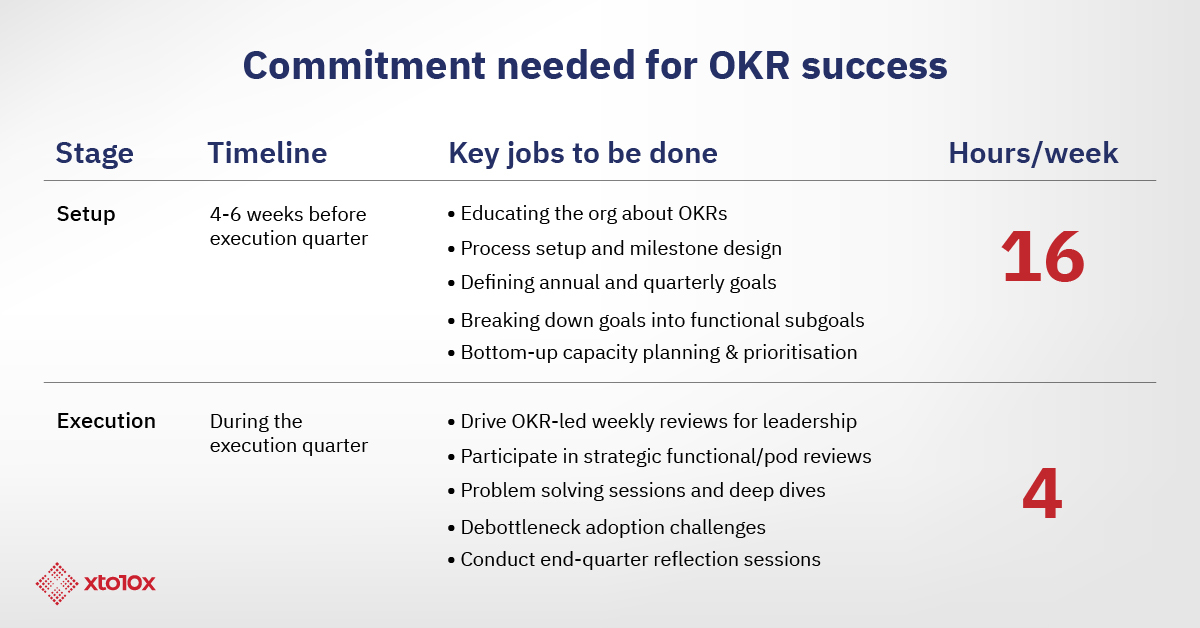Every startup needs a dedicated orchestrator for OKRs — and no, it cannot be the founder.
Two healthcare cofounders watched intently as Anusha Gopalakrishnan made her OKR presentation. Having just completed their Series A fundraise, they were eager to implement OKRs as a scaling initiative. One of them volunteered himself to lead OKRs for the company as soon as Anusha concluded.
Anusha is a veteran consultant in the OKR space — over the years, she has set up OKR processes in 100+ startups. One of her regular tasks is to dissuade enthusiastic founders from biting off more than they can chew in the OKRs area. “It’s natural for founders to want to drive OKRs themselves, but it’s also a big mistake,” says Anusha.
The notion that a founder should drive OKRs may seem sensible. After all, founders have the best vantage point. Why, then, should they not lead the key goal execution framework of the company? The answer lies in the nature of tasks involved.
Death by the founder’s hug
“Founders often see OKRs as a once-in-a-quarter goal setting and alignment exercise,” says Anusha, “But effective OKR implementation looks quite different.”
OKRs is more of a marathon than a sprint. It can be — and usually is — an iterative process. The OKR leader needs to drive two major phases: setup and execution. The setup phase is a one-time activity done with the objective of aligning the overall company towards the OKR mission. The execution phase requires weekly involvement to ensure smooth OKR adoption.
The following infographic summarises the key tasks of the OKR process.

“Imagine a founder driving all this in perpetuity. The moment something critical comes up, such as a fundraising opportunity or a merger decision, this entire process goes up for a toss,” says Anusha. And once the process breaks, it’s as good as dead.
A startup that connects retailers to local suppliers learnt this the hard way — the founder tried to drive OKRs, but the initiative fizzled out due to competing priorities. It is an extremely common fate. “That’s why we recommend that every startup should appoint an OKR champion,” Anusha adds.
Enter the OKR champion
The OKR story of a fin-tech startup went in a different direction. Here, the CEO had bestowed the OKR responsibilities to someone in the CEO’s office. She was well-known for her attention-to-detail and had successfully led key initiatives in the past. Over time, she established the OKR system by spending enormous amounts of time with leaders to address concerns and bottlenecks. She maintained dashboards which led to structured discussions in OKR meetings and adherence to timelines.
“What she has achieved is simply phenomenal,” says the founder. “In hindsight, letting her handle OKRs is possibly one of my best decisions so far.”
We have a term for such a ‘non-founder’, dedicated implementer of OKRs — an ‘OKR champion’.
‘Non-founder’ is, of course, not the only criteria for a good OKR champion — the person needs to have significant clout in the company to drive implementation, and must thoroughly understand the business in order to structure business goals.
“A Chief of Staff would make the best OKR champion. Otherwise, someone in the CEO’s office or the Head of Strategy or a strong functional leader might be suitable. However, we don’t usually recommend appointing the CHRO, as we want to avoid OKRs being perceived as an HR-led, performance management initiative.” – Anusha Gopalakrishnan, OKR Leader, xto10x
The inherent strengths of the candidate are also as important as their position.
First and foremost, the OKR champion must understand how the business operates. “The OKR champion naturally gains cross-team context and must understand the business well enough to put that to use,” says Anusha, “For example, the OKR champion in a gaming company once identified the revenue potential of a newly launched product feature and brought it on the radar of the growth team.”
The OKR champion must also have a strong rapport with the entire leadership team and the founders, so that they can drive adherence without authority.
They must additionally take on the role of a program manager. The fin-tech startup we mentioned earlier was a textbook example of excellent project management. “Everything was as per the best practices during the setup phase — not a single milestone was missed,” recalls Anusha. “Then, in the execution phase, the OKR champion defined timelines and pre-booked calendars of all leaders for the entire quarter! That was the best OKR project management I have personally seen.”

Founder as the biggest cheerleader
We don’t intend to give the impression that founders can relax while the OKR champion is doing all the heavy-lifting. Anusha has seen several instances of OKRs failing due to a lack of support from the founders. “In one company, the founder rarely turned up for the review forums,” recalls Anusha. “Leaders saw it as a signal that the OKRs process is not a priority. The OKR champion can’t do much in such cases.”
At its core, OKR is still a founder-led initiative — while the OKR champion drives the process, the founder determines the importance that the company places on OKRs. A founder who takes a halfhearted approach to OKRs cannot expect the champion to be effective.
The enthusiastic healthcare founder who volunteered to lead OKRs had his heart in the right place. It’s absolutely worth it to implement OKRs to scale a business in a healthy way — in fact, we would even go so far as to say that OKRs is a basic necessity. There is just one caveat: the founder should let someone else champion the OKR process, while providing their unceasing support.
What you should do next
- Unleash the true potential of the Chief of Staff role by Nishad Kenkre, Chief of Staff, Swiggy
- Implement OKRs to drive execution velocity in your organisation
- Demystify Objectives and Key Results (OKRs)


